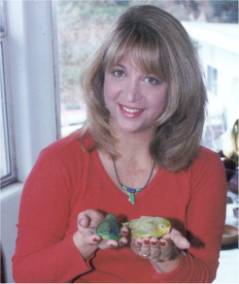I'm going to buy one or two parrotlets soon. I would like to drive down to pick them up. Is that possible? How long in advance do I need to make an appointment?
I would like to set aside a room in my home for the birds, and I have a couple questions. I'm worried about potentially harmful stuff in the room. I need to screen off an area, and make a screen door for their room. Is there a type of wire I need to avoid? Is there a "best type" of wire to use for this? The room is painted sheet rock with painted baseboards. If I have plenty of other stuff for them to chew on, will they chew on the paint? Anything else you can think of that I would need to know regarding giving them the run of a room?
Also, what are your feelings on one vs. two birds? Are they happier with companionship? Frankly, I don't want to deal with young birds. Would two same-sexed birds fight?
Thanks a bunch
Steve
Dear Steve:
Thank you for your email.
I have known several people that have attempted to keep parrotlets in a free-range, free flying situation and they have not turned out well. First, parrotlets, like all parrots do chew and would chew on everything from sheetrock to the floor coverings, all of which are very toxic. You could keep them in an aviary and there are many manufacturers of quality aviaries made with stainless steel which is the safest wire you can use.
Second, parrotlets are very territorial and aggressive birds. They are not domesticated birds like cockatiels or budgies and are still very much wild animals that respond by instinct. They have been designed by Nature to be aggressive and territorial ‘space’ because where they originate they compete for food, nesting space and safety. Many different animals eat parrotlets including other birds so being protective and defensive of their territory is what they do to survive. Many people report parrotlets being protective of their cages and most have to be removed from the cage in order to clean it and replace toys and perches. I always recommend feeders that can be accessed from outside the cage so owners can easily feed their parrotlets without having to remove them or worry about getting bitten. Having them free flying access to an entire room, they will perceive the entire area as their territory and they will, most likely, defend it with vigor especially if they can fly. In some cases this has resulted in the birds actually attacking their owners in order to drive them out of their territory. I have never recommended keeping parrotlets in this type of environment and do not feel it is either safe for them or their owners. I also do not recommend keeping parrotlets fully flighted for the same reasons. It is really the best way to teach a bird to be aggressive and learn to bite. All they have to do when they want to get away is bite harder and harder until the person let’s go. This reinforces the desire to be both aggressive and to bite.
I generally don’t recommend keeping two parrotlets as companions for one another. Pet parrotlets imprint on humans through the hand-feeding and socialization processes. They lose their instinct to bond with other birds and usually look at another bird as a rival or competitor not a companion or friend to keep them company. Also, as I have stated, they are territorial and aggressive and one often becomes dominant over the other and will not allow the other bird to eat, perch, etc. It doesn’t matter if they are being kept in an appropriate sized cage or a huge flight – they will attempt to drive the intruder out and this can result in injury or even death of one of the birds. Most people eventually have to house them separately and watch them whenever they are out of their cages and have physical access to one another. Most parrotlets that have a large cage, lots of toys and daily interaction with their owners are perfectly contented and healthy and not need nor want the companionship of another bird.
I am currently feeding 3 chicks but I have a waiting list for them; I probably will not have more birds until September or so. I almost always have a waiting list for my birds. I do not take deposits and work on a first-come, first-served basis.
I hope this helps and thank you again for contacting me.
Sincerely yours,
Sandee L. Molenda, C.A.S.
Subscribe to:
Post Comments (Atom)




No comments:
Post a Comment
Note: Only a member of this blog may post a comment.